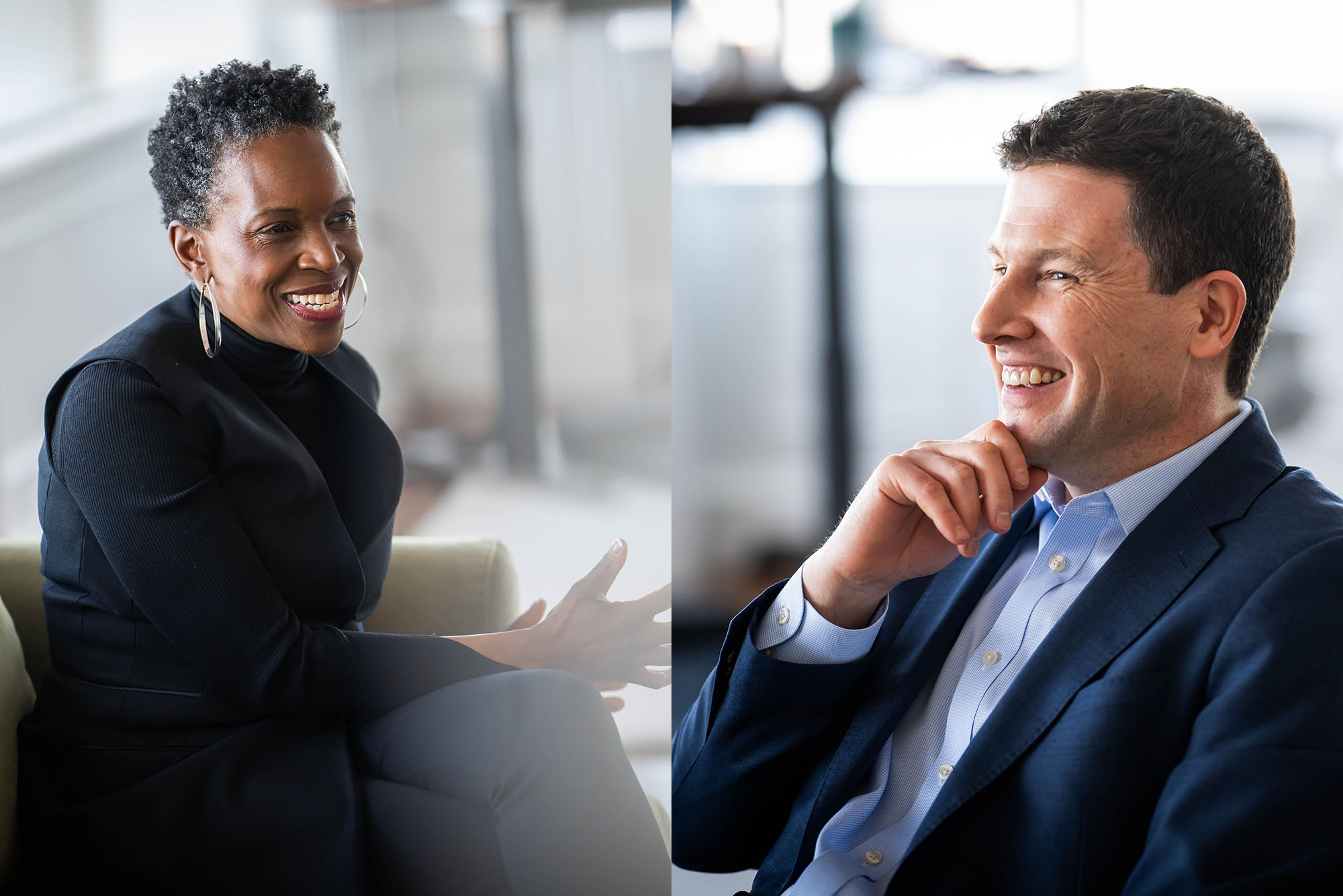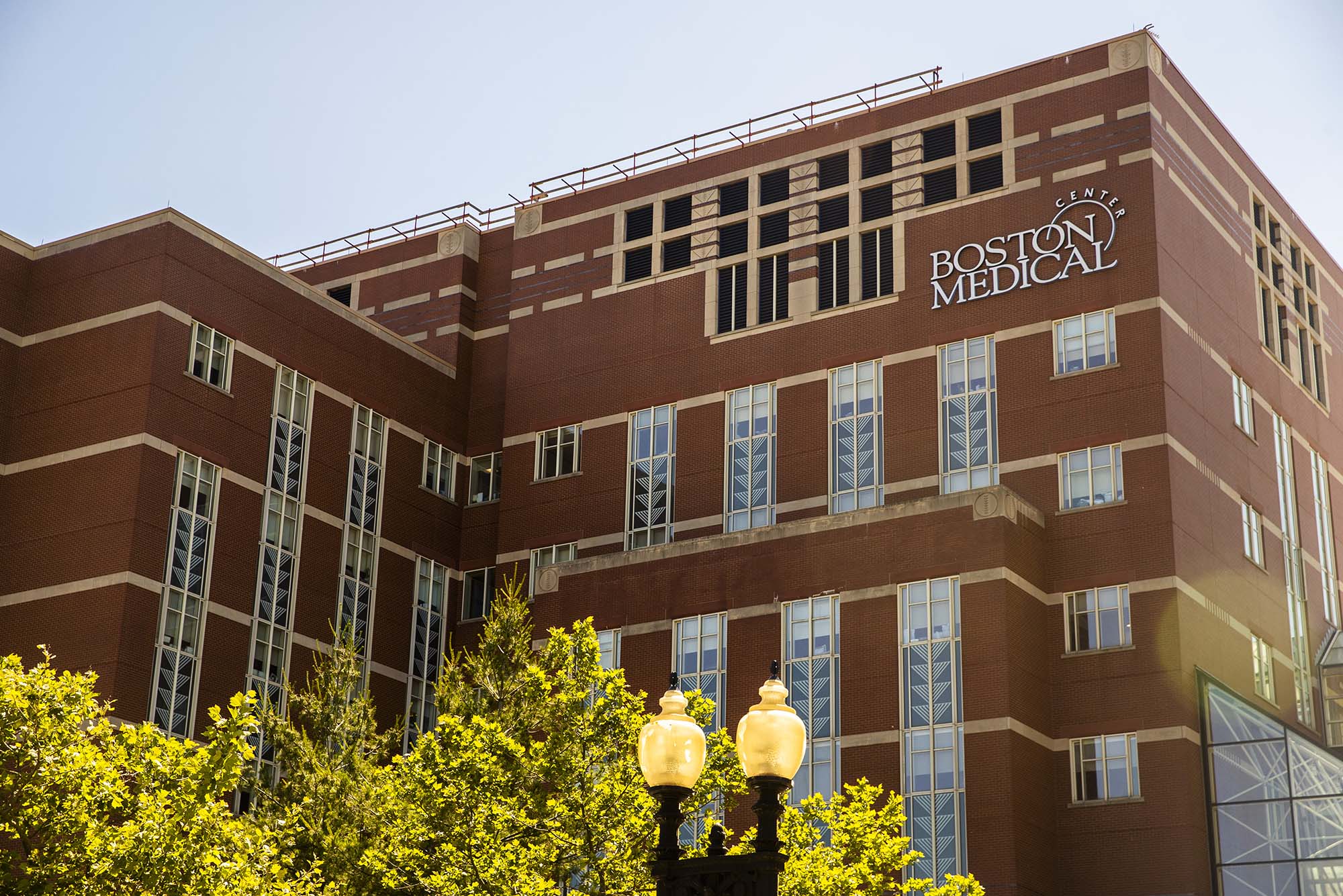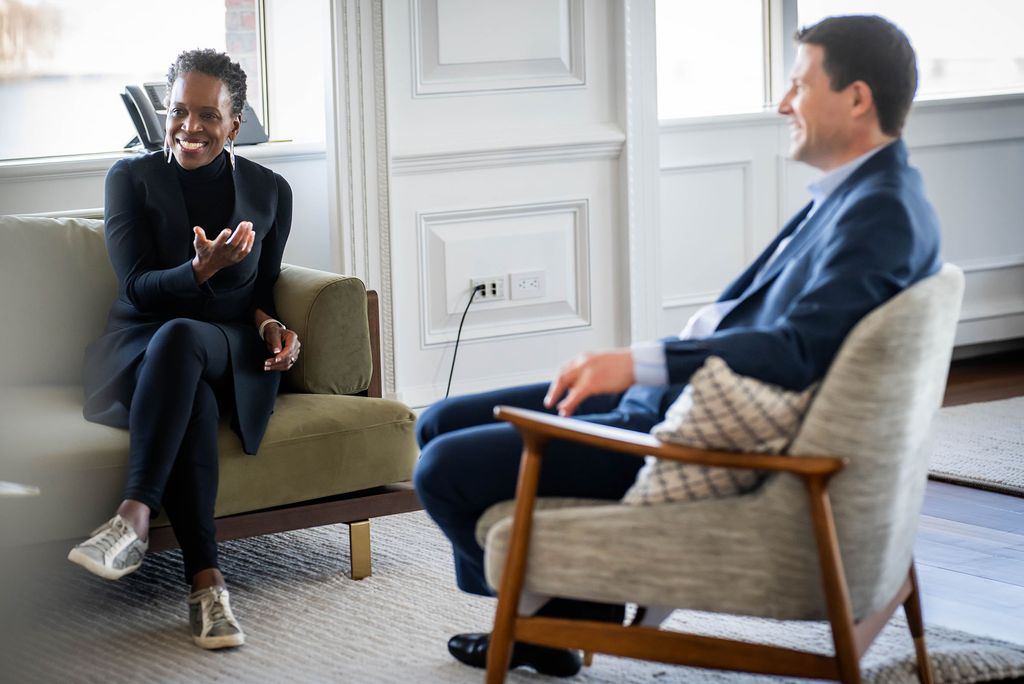In Conversation: The BU President and Boston Medical Center Health System CEO on Their Shared Vision and Optimism for Overcoming Turbulence

BU President Melissa Gilliam and BMC President Alastair Bell advocate for strengthening the relationship between the two institutions.
In Conversation: The BU President and Boston Medical Center Health System CEO on Their Shared Vision, Optimism, and Overcoming Turbulence
Melissa Gilliam and Alastair Bell discuss their partnership, the outsized role of BMC, Boston’s essential hospital and BU’s teaching hospital, the search for a new medical school dean, and headwinds and challenges
In a bright, sun-filled office looking out at the Charles River, Kenmore Square, and downtown Boston, the president of Boston University and the CEO of Boston Medical Center Health System, both of them physicians, sat down recently for a wide-ranging conversation. BU’s Melissa Gilliam, who is also a researcher in public health and the humanities, is less than one year into her role; BMC’s Alastair Bell is just two years into Boston Medical Center Health System, an integrated academic health network that includes Boston Medical Center.
As new leaders of vital institutions, they have quickly come to understand how the strength of their relationship is critical not only to the vibrancy of healthcare and research in Boston, but across the nation. And they are focused on reimagining the partnership between BU and the BMC Health System; they have formed a Joint Executive Committee of senior leaders from the medical center and the University to look for new strategic opportunities, as well as inefficiencies, and to strengthen the core operations while maximizing their institutions’ impact.
Gilliam helms the state’s largest private research institution, with 40,000 students and 11,000 employees on the Charles River and Medical Campuses.
Bell directs BMC Health System, which has more than 15,000 employees and includes BMC, the largest essential, or “safety-net,” hospital in New England; Good Samaritan Medical Center; St. Elizabeth’s Medical Center; WellSense Health Plan in Massachusetts and New Hampshire; and Clearway Health, a pharmacy solutions company. BMC, the system’s flagship hospital, has more than 8,000 employees, $110 million in research grants, and over 130,000 emergency room visits a year.
It’s an institutional partnership that dates back nearly 30 years, helping the city’s neediest patients and the well-being of Boston’s most historically marginalized communities.

That partnership was born on June 29, 1996, when the Boston City Council approved the deal to merge Boston City Hospital with Boston University Medical Center Hospital and create a new, private, not-for-profit entity called Boston Medical Center. At the time, Boston Mayor Thomas M. Menino (Hon.’01) called it the “most important thing I will do as mayor,” and said it was the only way the city hospital, founded in 1864, could survive for generations to come.
“Because of the actions we are taking today,” a proud Menino said at the time, “thousands of poor and uninsured patients will continue to have a place to go in Boston to get high-quality care.”
BU Today joined Gilliam and Bell in Gilliam’s office, where they talked about what comes next for their partnership, the role of their institutions in healthcare and to Boston, and the search for a new dean for the BU Chobanian & Avedisian School of Medicine.
This interview has been condensed and edited for clarity.
BU Today: Melissa, when you came to BU in 2024, you said you wanted to come to an institution with a medical campus and it was important for you to have an office on that campus, in addition to your Charles River Campus office. Why was that an important priority for you?
Melissa Gilliam: For a selfish and personal reason; I’m in higher education because of the impact on society that we can make. Hospitals and medicine are among the most important ways that institutions can be impactful in society and in changing people’s lives.
BU Today: And Alastair, what was your reaction when you learned that BU’s new president was also a physician with a background in public health?
Alastair Bell: I was very excited. I’d been at BMC for maybe 12 or 13 years at that time [Bell previously was executive vice president and chief operating officer for a decade], and we have had a very good relationship with BU. But I think there’s a sense of an opportunity not entirely realized on the Medical Campus. I interact with a lot of our faculty, and there is a sense that we should be doing things differently to make it easier to deliver both great clinical care and academic excellence. So, when I heard Melissa had been appointed president, and had a background as a physician, I was intrigued, because I thought, there’s a real opportunity now with someone who really understands academic medicine. Somehow before, it felt like the organizational agendas never quite lined up. But now, with both organizations in strong positions, the timing is right to pull up and say, “Hey, what do we actually want to do?”
BU Today: Melissa, as you’ve gotten to know Alastair, what have you learned about Boston Medical Center and his style of leadership?
The first thing about Boston Medical Center is that it has a clear place in the city as being the hospital to care for the most underserved populations. But it also has incredible expertise and people who really care about it. One of the things Alastair has said is that it has an outsized importance in the country. If something happens at Boston Medical Center, people everywhere are interested in it and interested in learning about it. For many institutions that care for underserved populations, they almost apologize for their work because the finances are really, really difficult. What I love about my interactions with Boston Medical Center is its core mission. The people are so mission-driven, and they care so deeply about it and are unapologetic about their loyalty and commitment to it.
BU Today: And Alastair, as you’ve gotten to know Melissa—how has that relationship evolved?
In any relationship, there’s always this point where you ask, “Do you really get on with each other and is this going to be fun?” I think I felt quite early on that things were going to be different, and fun! And one big early signal was Melissa’s presence on (the Medical) Campus was regular and consistent. People felt that you were here. You spent real time on the campus and met people—and that felt like a different level of engagement.
I felt quite early on that things were going to be very different. And one big reason was Melissa’s presence on [the Medical] Campus was regular and consistent. People felt that you were here.
BU Today: Boston is a medical mecca, a capital of healthcare. What is the role a place like BMC plays in Boston and beyond, since it serves a different group of patients and has a different mission than other local hospitals.
Gilliam: I spent my career practicing medicine on the south side of Chicago, serving the most low-income populations. What makes it so interesting to study, to research, to care for patients there, is that the medical problems are really complex. When you take diseases, and then you compound that with poverty and access and transportation and all of the other ways in which some communities are less resourced than others, it’s incredibly compelling and important work to do. And you do it with fewer resources.
BU Today: Do you see a lot of overlap at BMC with the work you did in Chicago?
Gilliam: Yes, very similar problems. And it’s interesting to try to address these problems in smaller cities. They almost feel solvable, but you’re still dealing with not only the medical problem, but all the social and political factors that contribute to it. So I think these are some of the most important issues for us as a society: how do we care for people?
BU Today: What is it that makes BMC special or unique?
Bell: When we say “BMC,” we’re really talking about an academic medical center in the South End of Boston. But we’re actually part of the BMC Health System. That’s a broader set of organizations on the care delivery side, including the Good Samaritan Medical Center in Brockton and St. Elizabeth’s Medical Center in Brighton. It also includes the WellSense Health Plan, which predominantly insures lower-income people in Massachusetts and covers about 40 percent of all Medicaid-insured people in the state.
BU Today: BMC, like BU, is also a major research institution. It recently ranked 19th in the nation in NIH research funding for independent US hospitals. What role does research play for the medical center?
Bell: So think about the research that you can do on how to best serve the populations BMC touches when you have all of the data from both the provider and payor, and you have vastly talented researchers that are uniquely focused on the issues that those populations are facing. Add to that, BMCHS’s position in the state and corresponding role in shaping health policy for traditionally underserved populations. It’s an amazing interconnection of research that can change policy, that can shape the lives of people not just within the medical center communities, but also with how other providers in the market deliver care.
When you go on to the national level, it’s not uncommon to go to a meeting or conference and hear people describing recent innovations they are pursuing that clinicians and researchers at BMC were doing 30 years ago. It actually started here.
I say all this because research has a very important role. Part of what excites me about BMC and the partnership with Boston University is not just what we do on the Medical Campus, but how the work we do together can have a much greater, radiating impact within the country. The populations we serve, and the issues we intersect with, demand innovation and new thinking, and I think we’re in a pretty unique position to be the source of answers.
Gilliam: The other thing I see here is that the level of research and the opportunity for discoveries are superb. And we have significantly more research than many institutions have, along with a spirit of collaboration that is very deep. It’s a very unique culture. I once trained a fellow who did her residency at BMC and she kept talking about it, and saying, “Will I ever get to work at BMC again?”

BU Today: For the first time in two decades, the medical school is searching for a new dean. Where does that search stand?
Gilliam: We’ve partnered together on the search for the new head of surgery, the head of medicine, as well as the new dean. We wanted to lay this foundation where the two of us were in conversation on these searches. For the new dean, our conversation centered on whether we wanted to begin the recruitment saying , “We have these two organizations, there’s lots of opportunities coming,” and then figure it out. Or do we want to say, “We have a shared vision for the future—and you can be a critical part of it, and we’ve started to lay the foundation.” Given where the organizations are, we decided on the latter.
We have a really good pool [of candidates]. We asked [BMC President] Tony Hollenberg to cochair the search, reflecting how important this is. And we have the dean of the Goldman School of Dental Medicine, we have scientists, someone from the School of Public Health, people from medical education, from the dean of the College of Engineering, to make sure their priorities are embedded within the search committees.
But I will add that even in the process of doing this, people have said to me that just having the two of us sit together and describe that we’re committed to it, this makes such a difference within this campus.
BU Today: Do you see any of the approaches or operations between the two institutions changing as the partnership evolves?
Gilliam: So we’re not the first to do this, right? You have integrated academic medical centers, and then there are places where the medical school and the university and the hospital are all separate, and they realize we’re better together. For us, it’s really important that the clinical components do well, and the research components do well. There’s a lot on the table, how we conduct research, how we support individuals and organizational initiatives, how we talk about ourselves. Those are all opportunities for us.
Bell: That’s well said. I think what’s struck me, having been at BMC for more than a decade, was how little I fully understood about the medical school, the infrastructure, and the setup at BU across the different schools.
Gilliam: What has been different for me is that I initially said the medical school and hospital were important. Then we had to say, “Oh, wait, we have a hospital system.” But really, what you should be thinking about is how you have data scientists and you have social workers and you have mental health providers and you have engineers. We have so many opportunities to collaborate that if you think about it as only a school and a hospital, you’re going to limit the possibilities.
Bell: Obviously, for us, our main goal is providing care. But there’s almost a moral imperative to also look at education and housing and economic mobility when you actually try to help our patients, members, and their communities thrive. When you look at all of those topics, and then look at the assets that exist in an organization as diverse and accomplished as Boston University, there are so many different interconnections.
Gilliam: Yes, that’s right. One of the things we’re doing is to ask where the key areas are that we as a university need to focus on as we think about our responsibilities and possibilities. So we’re interested in things like education and housing, those true social determinants that are critical and interesting to our researchers and to our students and to our role in anchoring communities.

BU Today: We can’t finish without talking about the pressures coming out of Washington and the political and societal headwinds. How are you handling what’s happening day in and day out?
Gilliam: I see two things. We have to continue to focus on impact, and we have to say what we can do better or differently, to ensure that we have impact in outcomes and we measure the outcomes. But I also want us to be really careful in the desire to prove ourselves. So if there is mistrust, are we explaining ourselves and our research? If you have been working in the communities that BMC is in, that I’ve worked in, medical mistrust is not new. It’s very, very long-standing. We can’t forget that. But I do think sometimes, in trying to explain things differently and just say what we’re doing, you miss the chance to change. So you have to be careful to listen, but also not to misunderstand what your core mission is.
Bell: Academics, like many areas, are in a very turbulent time. But I think fundamentally, if you pull it down to a human level, people want cancer to be cured, people have relatives suffering Alzheimer’s disease and are hoping for breakthroughs. People are living day in, day out, with chronic conditions or other forms of illness or living with disabilities and they’re really hoping for interventions, things that will help and provide relief. Those answers will come from academic medicine.
BU Today: You both actually sound somewhat optimistic. Is that accurate?
Bell: While there’s turbulence in the moment, ultimately, long-term, I think our odds are pretty good, because people like what we actually do. We have a bit of a communication issue at times, but the core of what we are in the business of doing is something that is needed and valued from the point of view of humanity.
Giliam: There are many things you can quibble with about the American medical system. But what we’ve done with life expectancy and how cancer research has been transformed, and what we saw with the COVID vaccine—it is an absolutely incredible story.
Bell: The other thing I feel at the moment is that one of the greatest risks, in moments of turbulence, is your core tendency to retrench and protect and look inward rather than outward. I don’t think we come through this successfully if we do that. Academia has a lot of threats, but I think if we have the right mindset, then I’m optimistic that we both weather it and we come out stronger.
Comments & Discussion
Boston University moderates comments to facilitate an informed, substantive, civil conversation. Abusive, profane, self-promotional, misleading, incoherent or off-topic comments will be rejected. Moderators are staffed during regular business hours (EST) and can only accept comments written in English. Statistics or facts must include a citation or a link to the citation.